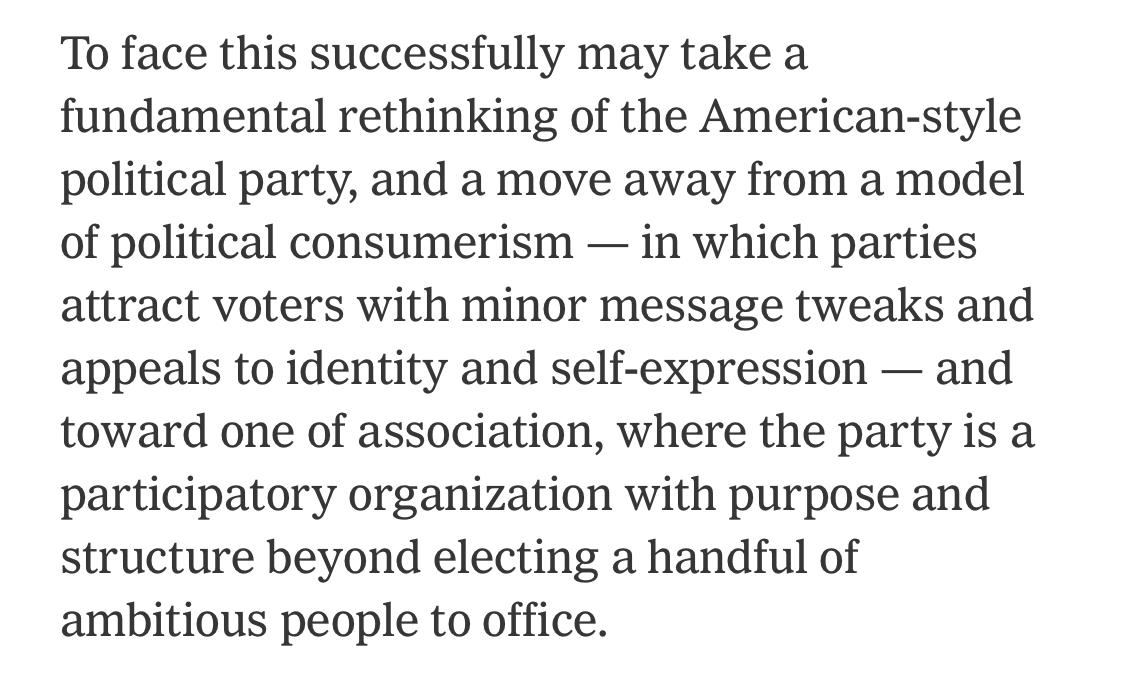adulthood is diaspora.
 Text: To face this successfully may take a fundamental rethinking of the American-style political party, and a move away from a model of political consumerism - in which parties attract voters with minor message tweaks and appeals to identity and self-expression - and toward one of association, where the party is a participatory organization with purpose and structure beyond electing a handful of ambitious people to office.
Text: To face this successfully may take a fundamental rethinking of the American-style political party, and a move away from a model of political consumerism - in which parties attract voters with minor message tweaks and appeals to identity and self-expression - and toward one of association, where the party is a participatory organization with purpose and structure beyond electing a handful of ambitious people to office.
i wonder if this is the end of history because from now on historians won’t be able to distinguish real from fake sources.
i still lurk there, and my twitter "For You" feed is now full of stuff related to a thing i've never discussed publicly, but have Googled, Clauded, and ChatGPTed about.
so fucking creepy.
(i've perpexitied too, just to be fair.)
Error establishing database connection.
radical centrists are utopian in the sense that they’re always nowhere at all.
"Being an Apple customer is like being in a 24/7 BDSM relationship…without a safe-word. Maybe you like the control Apple exerts over your life most of the time, but if they ever start to hurt you, there's no way to make them stop" @pluralistic https://pluralistic.net/2025/09/28/works-well/#fails-well
maybe we as a society decide we don’t want increased orality. maybe we put our thumb on the scale in a variety of ways for an internet of text.
the ethnonational reaction to liberalism, a backlash to the sense that important, protective, culturally important identities are dissolved under atomistic liberalism, will eventually occasion recourse to a more aggressively identity-undermining liberalism as the only way out of cycles of vengeance.
would you really prefer an immoral panic?
i feel like we are all, on every side, living through our villain origin stories.
“Neo-hustle-culture is a modern twist on Weber’s Protestant ethic: if the world is soon to be divided into the blessed and the damned, the techno-kings and the techno-peasants, anxious technologists should work as hard as they can to prove they deserve to end up on the right side of that divide.” @jasminewsun https://jasmi.news/p/dictionary
people who style themselves political realists have such unrealistic views about how swing voters behave. it's not the issues, or at least not the issues our two parties elevate as objects of political contestation. it's a sense of affiliation, or of shared resentments, or just personal respect.
eventually all prompts just generate an image of a crab.
why are they referred to as “scare quotes”? who is supposed to be scared?
i don’t really sleep anymore, but it’s okay now that our diffusion models can do our dreaming for us.
[new draft post] A pocketbook history of postwar US macro regimes https://drafts.interfluidity.com/2025/09/25/a-pocketbook-history-of-postwar-us-macro-regimes/index.html
what are the welfare economics of “agentic commerce”? https://www.coinbase.com/blog/coinbase-and-cloudflare-will-launch-x402-foundation
first time i ever saw a jimmy kimmel monologue i think. not bad. https://www.youtube.com/watch?app=desktop&v=c1tjh_ZO_tY